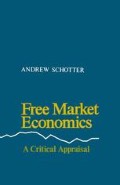Abstract
Chapter 1 discusses value judgments or assumptions upon which the free market argument is based. For instance, the argument is individualistic in that its advocates believe that the individual is the fundamental unit of the social structure. To the extent that one does not share this assumption, one is likely to disagree with free market conclusions. Likewise, one must accept the relevance and appropriateness of particular economic models before one can accept the invisible-hand laissez-faire faith assumption that social outcomes will be optimal if individuals are left free to barter and exchange. Similarly, the process orientation and belief in an equity-efficiency tradeoff are intimately related to and dependent on assumptions concerning the place of the individual in the social order and stand or fall with one’s view on that issue.
Preview
Unable to display preview. Download preview PDF.
Notes
See Jerry Green and Jean Jacques Laffont, Incentives in Public Decision Making, Amsterdam: North Holland, 1979.
Amartya Sen, Collective Choice and Social Welfare, San Francisco: Holden Day, 1970.
See Abba Lerner, The Economics of Control, New York: Macmillan, 1944.
F. A. Hayek, Law, Legislation and Liberty, Chicago: University of Chicago Press, 1948, p. 8.
See Harvey Liebenstein, “Bandwagon, Snob and Veblen Effects in the Theory of Consumer Demand,” Quarterly Journal of Economics, vol. 64, no. 2, pp. 183–201, 1950.
Robert Cooter and Lewis Kornhauser, “Can Litigation Improve the Law Without the Help of Judges?” Journal of Legal Studies, 9, January 1980, pp. 139–165.
See Armen A. Alchian, “Uncertainty, Evolution and Economic Theory,” Journal of Political Economy, 58 (3), June 1950, pp. 211–221.
M. Allais, “Le Comportement de l’Homme Rational Devant le Risque: Critiques de Postulates et Axioms de l’Ecole Americaine,” Econometrica, October 1953, 21 (4), pp. 503–546.
D. Kahneman and A. Tversky, “Prospect Theory: An Analysis of Decision Under Risk,” Econometrica, 47, 1979, pp. 263–291.
David Grether and Charles Plott, “Economic Theory of Choice and the Preference Reversal Phenomenon,” American Economic Review, 69 (4), September 1979, pp. 623–638.
Richard Thaler, “Toward a Positive Theory of Consumer Choice,” Journal of Economic Behavior and Organization, 1, 1981, pp. 39–60.
Author information
Authors and Affiliations
Copyright information
© 1985 St. Martin’s Press, Inc.
About this chapter
Cite this chapter
Schotter, A. (1985). Standard Criticisms of the Free Market Argument. In: Free Market Economics. Palgrave, London. https://doi.org/10.1007/978-1-349-08128-8_2
Download citation
DOI: https://doi.org/10.1007/978-1-349-08128-8_2
Publisher Name: Palgrave, London
Print ISBN: 978-1-349-08130-1
Online ISBN: 978-1-349-08128-8
eBook Packages: Palgrave Economics & Finance CollectionEconomics and Finance (R0)

